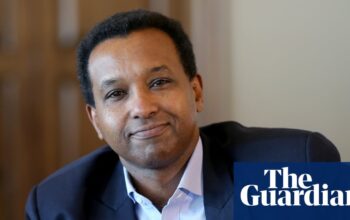“I want taxes on working people to be as low as possible,” the shadow chancellor told the BBC while out campaigning in south-east England.
“Under the Conservatives the tax burden has reached its highest level in 70 years. That’s why I’ve committed not to increase the rates of income tax, national insurance or VAT.”
Asked whether, if Labour did maintain the ongoing freeze on tax thresholds, it would increase the burden on working families, she said: “The Conservatives have of course locked in those changes where the tax thresholds are frozen for the next few years.
“I would like to reduce taxes on working people but you have to be able to say where the money is going to come from if you make a pledge and a claim like that.
“The public finances are in a real mess after 14 years of Conservative government.
“I will never play fast and loose with the public finances… I will never make a pledge without saying where the money’s going to come from.”
Rishi Sunak that it was a mistake to leave D-day events early. Asked whether he agreed with fellow Cabinet minister Mordaunt’s assessment that it was “completely wrong”, Harper said: “People make mistakes. The prime minister has made a mistake. He’s apologised for it. And he’s apologised to those that would have been particularly hurt by it.”
An opportunity for the media to ask questions of Rishi Sunak on Saturday was cancelled. The BBC’s Tom Symonds who was reporting from the Conservative election bus said journalists had been told it was “due to time pressure.” Sunak visited a walled garden at Auckland Castle, Bishop Auckland, and a village fete in Great Ayton, North Yorkshire, where he was asked by a consultant about the NHS backlog as he arrived.
Keir Starmer said it was his “duty” to thank veterans at the international D-day event which the prime minister skipped, but did not answer a question on whether Rishi Sunak’s apology was enough. He spoke as he made a campaign visit to 3 Locks Brewing Company, a canal-side craft brewery in Camden on Saturday.
Starmer said there “won’t be any surprises on tax” when asked if he would be cutting taxes as part of Labour’s manifesto. During a visit to north London on Saturday, the Labour leader said: “All of our plans are fully costed, fully funded, none of them involving tax rises over and above those that we have already set out.”
Starmer also said he wants to level the playing filed for small businesses as he pledged to overhaul the business rates system. The Labour party leader was joined by Dragons’ Den star Deborah Meaden in Camden, where she voiced her support for the party’s Great British Energy plans. Starmer said Labour’s GB Energy plan is “very popular” with small businesses.
The Tories have sought to move on from the D-day row with new policy offers, including a pledge to axe stamp duty for first-time buyers on homes up to £425,000. They also set out their “Backing Drivers Bill” which would ban Wales-style blanket 20mph limits and reversing the ultra-low emission zone (Ulez) expansion from inner into outer London.
Ed Davey said Rishi Sunak’s snub of a major international D-day event was “a letdown for our whole country”. On a campaign visit to Victoria Park in Newbury, Berkshire, the Liberal Democrats leader told broadcasters: “I’ve felt pretty cross about this. I’ve talked to veterans and they feel quite angry. So, I think they need to do more.” He urged the Conservatives to give some of the cash donated to the party by Frank Hester, a businessman who was embroiled in a racism row, to charity.
Davey denied that the Liberal Democrats are the party of nimbys for focusing on national parks amid a housing crisis and low economic growth. The Lib Dems vowed to plough £50m a year into maintaining three new national parks in their latest policy offer. Instead, Davey accused the Conservatives of being the party of nimbys, “but they’re also the party of developers”. He added: “They have a developer-led approach. We have a community-led approach.”
Scottish first minister John Swinney said Rishi Sunak had “completely destroyed” his credibility as prime minister by leaving D-day commemorations early. Speaking to journalists on the campaign trail in Livingston, West Lothian, he said: “The prime minister and especially the Conservative election campaign is now utterly in tatters.”
Swinney said former first minister Nicola Sturgeon has a “huge” contribution to make in the SNP’s general election campaign. Swinney would not be drawn on why his former boss had not been seen alongside him on the campaign trail so far, as he visited the Reconnect Howden Park Centre, where he met young performers on Saturday.
The claim made by the prime minister that Labour would raise taxes by £2,000 is “misleading”, the shadow business secretary said. Jonathan Reynolds said Labour, if it wins the election, would inherit some tax rises included in the government’s existing spending plans, but insisted there would be no additional taxes on households. “It is a lie,” he told BBC Breakfast on Saturday.
Tax rises “hiding in plain sight” that will cost UK households an average of £800 a year are already on the way whoever wins the general election, a leading thinktank has warned. While the Conservatives and Labour argue about what levies the other would introduce in power, the Resolution Foundation has warned that already announced measures will increase the total tax take by about £23bn a year by 2028-29.
A snap viewer poll taken after last night’s seven-party TV debate placed Nigel Farage as the winner. The poll, conducted by researchers More In Common, asked more than 1,000 viewers who won the debate, with 25% of those surveyed opting for Farage. Among those who voted Conservative in 2019, 47% placed the Reform leader at the top of the pile.
The BBC general election debate between seven senior political party figures was watched by more than 3 million viewers, the broadcaster has said.
The Home Office is facing a new Windrush-style scandal after a landmark high court ruling found that the home secretary acted unlawfully by failing to provide documents to thousands of migrants proving they are here legally.
The Home Office is facing a new Windrush-style scandal after a landmark high court ruling found that the home secretary acted unlawfully by failing to provide documents to thousands of migrants proving they are here legally.
The charity Ramfel brought the legal challenge along with Cecilia Adjei, a healthcare worker and mother of two boys aged 17 and 11, who came to Britain from Ghana in 2000.
The charity said hundreds of thousands of migrants were potentially affected by the Home Office’s failure to provide confirmation documents showing that people who apply to extend their visas are here legally while the applications are being processed. This is known as “3C leave”, an automatic form of immigration status while they wait for the Home Office to process their application.
Some have their jobs put at risk while others face difficulties accessing higher education, healthcare and the right to rent a home because they cannot prove they are here legally.
The case echoes the problems faced by the Windrush generation, who were unable to prove they were here legally and so struggled to work, rent and access benefits.
Labour ahead of the election, said she “wanted to know what his plan is for waiting lists” and said the government had left the NHS “completely unprepared” for the pandemic.
Tom Wilson, Labour’s candidate for the reorganised Richmond and Northallerton constituency that Sunak is seeking to hold, was also at the village event and at one point could be seen following the prime minister’s party at a distance, according to the PA’s reporting.
Finally, here is that promised picture of Ed Davey out on the general election campaign trail today playing adventure golf while a Tyrannosaurus rex looks on.
Wokingham Family Golf in Berkshire advertise the spot as “a brand new 18-hole course taking golfers back to the drama and excitement of the Triassic, Jurassic and Cretaceous ages”.
The BBC general election debate between seven senior political party figures was watched by more than 3 million viewers, the broadcaster has said.
An average audience of 3.2 million tuned in across BBC One and the BBC news channel on Friday evening to watch the politicians clash, according to overnight ratings.
The lineup for the first multiparty debate in this year’s campaign featured Penny Mordaunt, the Conservative leader of the House of Commons, Labour deputy leader Angela Rayner, Liberal Democrat deputy leader Daisy Cooper, SNP Westminster leader Stephen Flynn, Plaid Cymru’s Rhun ap Iorwerth, Green Party co-leader Carla Denyer and Reform UK’s Nigel Farage.
This might be the first TikTok general election, but it probably won’t be the first election decided by it for one simple reason: the video app’s British users are already likely to vote Labour.
“The problem is that almost everyone on TikTok is already on our side,” said one Labour campaign source. “We need to reach swing voters.”
TikTok’s relatively youthful user base and Labour’s enormous poll lead among younger voters has given the app a strange role in this election. There’s no doubt that tens of millions of Britons are consuming election content on the platform. It is an excellent place for memes to spread, embarrassing videos to go viral, and passionate political opinions to find an audience. And all the parties feel they have to engage with it.
Yet it is also seen within Labour as an unreliable way of carrying Keir Starmer’s core messages on economic or education policy to “Whitby Women” and the other precise groups of undecided voters who will decide dozens of marginal constituencies over the UK.
Even being on TikTok is a strong indicator that someone is already inclined to vote Labour, according to research by Deltapoll. They found TikTok users are 31% more likely to vote for Keir Starmer’s party than people of the same age and background who do not use the video app.
“The conclusion you can take from that is that you’re more likely to be a Labour voter if you use TikTok,” said Mike Joslin, a veteran digital campaigner who commissioned the research for his artificial intelligence start-up Bombe. “Other channels offer you more control over reaching undecided voters.”
You can read Jim Waterson’s full piece here:
On a sunny afternoon in the picturesque Hertfordshire town of Berkhamsted, recent graduate Sadie Bond is making an unusual apology to the local Lib Dem candidate, Victoria Collins. Bond says she is going to vote for Collins next month, but feels compelled to disclose her motivation. “It’s tactical, I’m afraid,” she says. “I’ve only ever really known a Tory government and I’m very much fed up with it. Everything feels a bit hopeless. I want Labour to come into power, but I know that isn’t going to happen in this constituency, so I’m voting Lib Dem.”
Far from being offended, the confession is music to the ears of Collins, who has been working to convince voters that she and the Lib Dems are the best vehicle for anyone simply wanting to stop the Tories here. While Harpenden and Berkhamsted is a new seat, it would be a solid brick in the Conservative blue wall in more normal political times. What makes the Lib Dem task here more intriguing is that this seat is sandwiched between two Labour targets – Hemel Hemstead and Welwyn and Hatfield. In the latter, Keir Starmer’s party hopes to fell cabinet minister Grant Shapps.
As a result, this corner of the county has become a testing ground for a tactical voting drive that could help turn a bad result for the Tories into an outright disaster. To pull it off, Lib Dems want voters in Wheathampstead to be clued up enough to back them, while anyone wanting to register an anti-Conservative vote a short amble away in Lemsford will have to know Labour is the best bet.
Alarmingly for Conservative HQ, many polling experts believe the conditions are ripe for a repeat of 1997, when tactical voting benefited Labour and the Lib Dems and cost the Tories dozens of seats, most notably the toppling of Michael Portillo in Enfield Southgate. This time, Shapps is among the big beasts who could suffer their own polling night infamy.
Tactical efforts came to little at the last election. Hopes among pro-Remain campaigners of an anti-Brexit tactical vote were dashed as Boris Johnson won an 80-strong majority. But conditions have changed. Peter Kellner, the veteran pollster, wrote in the Observer before the 1997 election that while he detected little “positive enthusiasm” for Labour, an electorate with “a burning desire to end 18 years of Tory rule” made for receptive tactical voting conditions. He believes similar ingredients are present today.
You can read Michael Savage’s full news feature for the Observer here:
arrested and later released without charge as officers probe the spending of £600,000 of SNP funds.
Her husband and former party chief executive Peter Murrell was charged with embezzlement as part of the probe. Former party treasurer and current MSP Colin Beattie was also arrested and released pending further investigation.
Charges have not been brought against Sturgeon or Beattie, and Police Scotland say the investigation “remains ongoing”.
In May, Sturgeon was quizzed by journalists on why she had not yet joined her former deputy – now first minister – to campaign for the party as part of the election.
Sturgeon replied: “I will be campaigning in the election from time to time, yes.” When pressed on whether she will campaign alongside the first minister, she added: “John will have his own programme and I will campaign in ways that I think are helpful to candidates.”
Swinney would not be drawn on why his former boss had not been seen alongside him on the campaign trail so far, reports the PA
Speaking as he visited the Reconnect Howden Park Centre, where he met young performers, Swinney told the PA news agency:
I welcome very much Nicola’s contribution to our election campaign. She is supporting a range of different candidates around the country and that’s good.
I work collaboratively and closely with Nicola, and welcome her participation in the campaign.
I think Nicola has got a huge amount to contribute to the SNP and the cause of Scottish independence.”
Source: theguardian.com


